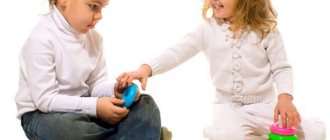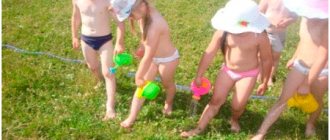Development of the psyche of children at 7-9 years old
At this age, children study in primary school. And during educational activities, their psyche actively develops.
They develop voluntariness and awareness of cognitive processes (attention, memory, perception, etc.).
Children begin to plan their actions in their minds and analyze them. They also learn to reflect.
They develop a worldview and a sense of self.
Intellectual sphere
A 7-9 year old child is actively developing his personal consciousness. He seeks to understand his place in relationships with adults.
Through educational activities, the student realizes his abilities. They develop through a stable interest in a business and a strong motivation for it.
The child likes to be competent. Studying broadens his horizons and improves his thinking.
Younger schoolchildren are interested in social motives. He wants to be cultured and developed, to study well, and then, in adulthood, to work well.
He has new relationships with others, rights and responsibilities.
His moral personality traits, self-awareness and worldview are formed.
The child invents, comes up with his own concept of the world around him. He needs to organize everything, understand patterns, etc.
The younger student understands ethical standards (for example, what is “good” and “bad”) and learns aesthetic ones (for example, he believes that beautiful cannot be bad).
Attention
The child becomes much more attentive than in preschool childhood.
He already knows how to concentrate on uninteresting actions and study with concentration for 10-20 minutes.
By the age of 9, children will be able to work for quite a long time without being distracted or making mistakes. But even then they are able to get distracted by something more interesting.
In general, involuntary attention predominates in a primary school student. External impressions are important to him, and because of this it is difficult to concentrate on incomprehensible and complex material.
At this age, a particular child has his own peculiarities of attention. Some find it difficult to quickly switch from a diligently solved task. Some people easily shift their attention to a new task, but are also easily distracted. And some guys have well-organized attention, but its volume is still very small.
Memory
Children aged 7-9 years continue to develop voluntary memory. It is closely related to thinking.
They have a well-formed mechanical memory and can easily “memorize” material. But in order for the text to remain in memory for a long time, the children need to understand it.
Students can consciously and meaningfully remember interesting material through play. They also learn to memorize using various mnemonic techniques.
In general, at this age memory is concrete and figurative. A child can quite easily reproduce educational material based on text or a picture, but it is still difficult for him to remember something himself.
Thinking
The child’s thinking begins to move from visual-figurative to verbal-logical.
He learns to reason based on specific visual objects. The child analyzes, draws conclusions, establishes cause-and-effect relationships.
Even the youngest schoolchild begins to solve figurative problems, and also to move from the specific to the general, and vice versa.
Now he analyzes the knowledge received from parents, peers, television programs, and draws his own conclusions.
He knows how to use visual-schematic thinking (that is, he relies on layouts, diagrams, etc.).
At 7-9 years old, the child begins to master scientific concepts.
In addition, the child’s thinking characteristics develop. You can notice “thinkers”, “practitioners” and “artists” among the children.
Perception
Guys at this age usually notice not the main sign, but what first caught their eye.
But they learn to purposefully study an object: examine, explore, observe.
The development of perception is now influenced by speech. When studying something, the child names and identifies the qualities of an object or phenomenon.
Perception becomes synthesizing, the student establishes connections between phenomena.
Imagination
The imagination becomes more manageable.
The child now more correctly imagines reality based on his knowledge. This occurs because he develops critical thinking.
Also, a junior schoolchild can “reproduce” images and ideas about an object or phenomenon.
Speech sphere
A schoolchild’s speech is closely related to the development of thinking and other cognitive processes. After all, during study, verbal reasoning helps, for example, solve a problem.
His vocabulary contains about 7,000 words. This volume depends on your outlook, quality of communication with adults, etc.
The child masters the sound analysis of words.
He learns to retell, describe, etc. This is how coherent monologue speech is formed - oral and written.
Emotional sphere
After the end of the crisis of 7 years, the student begins to develop a so-called “generalization of experiences”, a logic of feelings arises. These experiences give rise to the child’s inner life, which influences behavior.
Before doing something, the child begins to think and realize what emotions he will receive from this action. He begins to hide his experiences from others. This is how the “loss of childish spontaneity” manifests itself.
At 7-9 years old, the child already regulates his behavior and tries to keep his promises.
Also, as we emerge from the crisis, mannerisms, antics and pretentious behavior go away.
Children learn self-regulation, hard work and independence.
Their emotions are now more stable and deep. Permanent interests and friendships emerge.
The children begin to show more pronounced characteristics of character and behavior.
Educational activities
The leading activity at this age is educational
Educational activity becomes leading at this age.
It is important for a child to be successful in school. He wants adults and peers to notice this. His self-esteem and self-respect depend on this.
The younger schoolchild begins to evaluate his knowledge and analyze it (he didn’t know how to do this before, but now he can, etc.).
Academic success gives a student a sense of competence. And constant academic failures bring a feeling of inferiority.
The educational activity of a child aged 7-9 years can be based on the following motives:
- high praise, approval of others;
- desire to learn new things;
- desire to be successful;
- motive to avoid failure.
Communication sphere
Educational activities also concern the communicative sphere.
The teacher becomes the center of the child’s social life. He is a great authority for a schoolchild.
While studying and playing, children begin to act together, take the point of view of another, and see themselves from the outside.
Physiology of age
The average height of seven-year-old children is 121 centimeters and their weight is 23 kilograms. The lungs grow rapidly, the cardiovascular system develops, and blood circulation gradually stabilizes. At this age, the last stage of formation of the respiratory, digestive and other body systems begins.
The musculoskeletal system develops. It is important to give the body a break, because a long time spent in one position leads to changes in the skeleton: curvature of posture, deformation of the chest. The child himself feels this and becomes restless when he gets tired of being in one position. Therefore, it will be useful to go for a walk after school, play with friends or attend sports clubs.
Difficulties of age
During this period, the crisis may last for 7 years.
But, in general, the age of 7-9 years is a “lull”. The child is calm, friendly, open to knowledge and strives to be successful in school.
But if things don't go well at school, he may become anxious, short-tempered, or
rude. These are signals that the student needs adult help.
Favorable development: tips for parents
It is important for a child to be successful, competent and accepted in his class. But sometimes children can “close themselves off”, experiencing their failures alone. Therefore, parents need to be sincerely interested in his school affairs (not just his studies). The questions might be something like this. What does he like most about school? Who did he talk to today?
You need to be attentive to the child’s feelings and not downplay their significance.
When doing homework together, you should remain patient and help based on the student’s characteristics. Some people need diagrams and images, others need reasoning out loud, etc.
It is necessary to limit the time spent at the computer or in front of the TV. It is better to spend active and interesting time with the whole family.
You need to follow a clear daily routine. At the same time, the child must have time for his favorite games and active walks in the fresh air. Various sections and clubs are not leisure.
A child 7-9 years old needs to be able to help adults with housework and carry out assignments independently. Of course, things must correspond to his age and skills.
During this period, it is necessary to clearly understand the basics of independent and safe behavior at home and on the street. For example, rules of the road, handling electricity, gas, first aid kit, etc.
It is necessary that the child knows how to contact strangers. He must memorize emergency phone numbers and parents' phone numbers. It is important that the student understands who he can turn to for help if necessary.
The age of 7-9 years is called junior school age.
All mental processes become voluntary, the child learns to obtain knowledge and analyze it. He creates his own picture of the worldview.
A new authority appears in his life - a school teacher, and his self-esteem is based on his success at school. Parents need to give their child more independence when making decisions, and also provide him with easy assistance in mastering educational material.
If you liked the article, please share a link to it
Age characteristics. Crisis 7 years. article (grade 1) on the topic
Age characteristics
Crisis 7 years
The transition of a child from preschool to primary school age is accompanied by the development of a normal age-related developmental crisis—the 7-year-old crisis. The development of the baby occurs unevenly and represents an alternation of crisis and calm (summer) periods, which alternately replace each other. Each new stage of development invariably begins with a normative age crisis, which almost all children of the corresponding age go through. The crisis of 7 years is not the first: in its development the child has already gone through several similar crises - the crisis of the newborn, the crisis of the first year and three years.
The onset of the seven-year-old crisis usually coincides with the moment the child enters school. Typically, older preschoolers strive to start school as quickly as possible and rush this moment in every possible way. Thanks to classes in kindergarten, introductory visits to school and communication with friends who have already become schoolchildren and demonstrate their adulthood to the kids, children from 6 to 7 years old are well acquainted with the features and rules of school life. The child understands that studying at school imposes new responsibilities on him, but he is ready to fulfill them because he wants to feel like an adult as soon as possible.
Becoming a schoolchild means for him to touch the lives of adults, through this he gets the opportunity to feel like a full-fledged member of society. As the moment of entering school approaches, the child begins to perceive himself not just as Tanya or Seryozha, he begins to perceive himself as a student, a participant in school life, that is, the child for the first time begins to realize his social self . All this determines the emergence of a new psychological characteristic in the child - self-respect. However, some children do not show a desire to study at school, do not want to leave kindergarten, wanting to continue to remain small and defenseless.
Why is this happening? On the one hand, the cause of this phenomenon may be the position of the adults surrounding the child. It's no secret that many of us are dissatisfied with today's life and our place in it. Often parents try to compensate for this feeling of dissatisfaction with the help of their children. How often can you hear from mothers who bring their kids for a consultation with a psychologist before entering school: My Sasha is a very smart and quick-witted boy, I think that he will study better than anyone in the class! Often such parents do not see the existing developmental problems of the child, do not accept the recommendations given by teachers and psychologists, believing that their child is the best. At the same time, they scold the child when he does something wrong, not realizing that the baby cannot learn everything at once; he needs to put in a lot of effort to actually turn out to be what mom and dad want him to be. Of course, it’s not bad when parents support their son or daughter, forming a positive assessment of him. It’s worse when this support becomes absolute, when the child actually begins to perceive himself as special, the best and the smartest. In this case, the child may develop a fear of being insolvent, a fear of not living up to the enormous hopes that are placed on him.
On the other hand, the reason for the decline in children’s desire to study at school may be the fact that modern training and education programs in kindergarten are becoming more and more similar to school ones. Already in kindergarten, the child begins to get used to the lessons and the teacher who comes to study in their group, to the school daily routine. In this case, entering school ceases to be perceived by the child as something special, he loses interest in it, and his desire to try on a new role—the role of a schoolchild—reduces.
So, self-esteem is the main new formation of the 7-year crisis . An older preschooler begins to strive to participate in the life of not only his family, but also society as a whole, and the closest and most accessible way in his perception of realizing this desire is to enroll in school. That's why most children look forward to this moment, play school with pleasure and go through the school supplies bought by mom and dad several times a day. A six-seven year old child strives in every possible way to demonstrate that he has already become an adult, that he knows and understands a lot, he wants to constantly participate in conversations with adults, express his opinion and even impose it on others. Children of this age love to wear adult clothes; they often try on their mother’s shoes or father’s hat; girls, when their mother is not around, try to use her cosmetics.
As a rule, all this displeases parents; they constantly pull the child back, urging him not to disturb mom or dad and to behave decently. Thus, you and I, dear parents, voluntarily or unwittingly suppress the child’s need to feel like an adult and respect himself. This happens because adults, in their internal perception of the baby, as a rule, lag behind his real development, that is, our baby seems to us weaker and less independent than he really is. Unconsciously, you and I want the child to always remain as small and defenseless as he was when he was lying in his cradle, and we strive in every possible way to protect him from the difficulties and vicissitudes of life, suppressing his ability and need to be independent.
Thus, there is a fairly significant gap in the child's perception of himself and his parents' perception of him. Not receiving from adults the opportunity to be independent and demonstrate their opinions to others, the child looks for new ways to fulfill the need that has arisen. He discovers that he cannot simply express and express what he thinks, because by doing this he causes a feeling of dissatisfaction in the adult. Not being able to speak directly, the child begins to grimace and act up, attracting the attention of adults in ways available to him. Here another gap, characteristic of the 7-year crisis, appears. On the one hand, the child wants to appear adult and independent, on the other hand, he uses childish forms of behavior (antics, whims, etc.) for this. Psychologists call such reactions regressive forms of behavior.
If you begin to notice that your 6-7 year old child is increasingly attracting attention to himself, becoming capricious and irritable, while striving to participate in all your affairs and conversations, you can assume that the baby is entering another crisis period in his development. We think that you, dear mothers and fathers, grandparents, already have some experience of communicating with a child during periods of crisis and know that all these phenomena are absolutely normal and, moreover, necessary for the further psychological development of the baby. Nevertheless, we will take the liberty of giving you some simple recommendations on how to communicate with your child during this difficult period for him, and they, we hope, will help you overcome the existing difficulties as quickly and painlessly as possible.
- Encourage your child's independence and activity , give him the opportunity to act independently. Try to take on the role of a consultant, not a prohibitor. Help your child in difficult situations.
- Involve your child in discussing various “adult” problems . Ask his opinion on the issue under discussion, listen to him carefully before criticizing. Perhaps there is a rational grain in what the child says. Give him the opportunity to speak out and tactfully correct him if he is wrong about something.
- Be prepared to accept the baby's point of view and agree with him . This will not damage your authority, but it will strengthen your child’s sense of self-esteem.
- Be close to your child, show that you understand and appreciate him, respect his achievements and can help in case of failure . Show your child a way to achieve what he wants and don’t forget to praise him if he succeeds.
- Encourage even the smallest success of your child towards achieving his goal. This will help him strengthen his self-confidence, feel strong and independent.
- Answer your child's questions . Don't brush off your child's questions, even if you've answered them many times. After all, 6-7 years of age is the age of why, a child is interested in literally everything, his curiosity knows no bounds. The opportunity to get answers to all questions that arise gives a strong impetus to the intellectual and social development of the baby.
- Be consistent in your demands. If you do not allow your child to do something, then stand your ground until the end. Otherwise, tears and hysterics will become a convenient way for him to insist on his opinion. Make sure that everyone around you places the same demands on your child. Otherwise, what mom and dad don’t allow will be very easy to beg from grandma - and then all your efforts will go down the drain.
- Set an example of “adult” behavior for your child. Do not show resentment, irritation, or dissatisfaction with the other person in front of him. Maintain a culture of dialogue. Remember that your baby imitates you in everything he communicates, and in his behavior you can see a mirror reflection of your habits and methods of communication.










